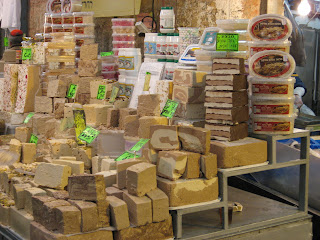Purim comes at the end of Israel’s version of winter (known as autumn north of the Mason-Dixon line), which means that all the “limited edition” chocolate bars are still around: Pesek Zman bars with orange or coconut, Elite chocolate with liqueur filling, etc. Rest assured these things find their way into Mishloach Manot. People in Jerusalem can be seen delivering their “shaloch-monis” the day before Sushan Purim, if not a bit earlier. People double park, have their kids run in, or just walk them to the intended recipients, costumes and all.
As I noted in a prior post, for all their prickly protests, Israelis really are sweet-at-heart sabras when it comes to Purim. The holiday has the mass appeal of Halloween in the US. But the tenor of Purim day is so different from All Hallows Eve; and I think part of that has to do with the joy – and frustration- of Mishloach Manot. In many ways, putting the little sacks and baskets of food are a lesson. A set of lessons, actually, some of which are annoying and others are very Jewish.

Having worked very hard with ribbon, fruit and cellophane, you often deliver your hard work to those whose reaction you will never know; your pride and joy quickly becomes another basket in the pile in front of the door. They are out delivering too (and sometimes you are at each other's doors at the same minute). You just leave it and hope that the friends you are giving a basket to are going to enjoy it.
Lesson: It is worthwhile to enjoy giving for giving’s sake, and giving without being asked is important.
Sometimes there is a knock at the door and you are given
Shaloch-monis, and you are completely unprepared for it. Who would have thought
they had
you on their list? And because it is a surprise, you have to quickly assemble something for them. Its always under pressure, because they have 12 more homes to reach and need to go, and you just put in 3 oranges and a head of garlic in with the chocolate because its all you could think of…. Or you ran out of stuff, because you only made 4 extras and stand there sheepishly.
Lesson: Be prepared. Also, sometimes there are good surprises.
There are deliveries to an aged relative, or someone living alone, or new in town, or going through trouble. Then give your little plate of treats, and get you see their face light up, frowns are erased, and it can take 20 minutes to get out because they are so glad to see you. And you would never get to see this if you didn’t give without being asked.
Lesson: Sometimes there are good surprises- and sometimes you get to deliver them.
At some point in the day you will deliver to someone whose door is barricaded by bags of stuff. And not just a few small packages, but envy inducing towers, expertly wrapped and dressed. These are filled with good wine, an entire salami, hand made truffles and fluorescent tinged candies in imperial tiers of cavity causing glory. Next to those, your hard work seems to be nothing more than a dinky, ugly little bit of
gournisht. And when you come back to your door, the collection of deliveries nestled there seems
shvach and meager. But you do your best to be thankful, as you know that there are those who have gotten no baskets, bowls, or plates.
Lesson: Sometimes its hard not to be jealous or resentful. But you do your best anyway.
Sometimes people don’t think of you and it hurts; and sometimes you forget others, and they are hurt. Does it really matter that much you didn’t get another orange and two candy bars? Yes, it does. Is Uncle Leroy that hurt? Yes, he is.
Lesson: Details matter. Being forgotten by someone occasionally helps you not to do the same to others.
Halloween is oft compared to Purim, because of the Costumes and candy. But the resemblance is superficial. Halloween’s necrophobia aside, at the core of that day for most kids is the call of “Trick or Treat,” which in these days has devolved into a form of extortion. Give us a treat, or we’ll play a trick on you.
But unlike the blackmail that is implied with “Trick or treat”, Mishloach Manot teach a complex set of life lessons. Sometimes you are surprised and sometimes you are disappointed; you will give to those who do not thank, and be unable to thank those who give; yet you try your best to share what you have with those you love and those you live near.It is hard to teach a child all of that, especially since they know that you have to share the Mishloach Manot with everyone at home, but their Trick-or-Treat candy is usually theirs and theirs alone. Parents of Jewish children outside of Israel have a simple choice to make; emphasize modern Halloween with its fear, extortion, and selfishness; or give real effort to teach Purim’s charity, generosity, patience and thankfulness. You would think the choice would be a clear one for them.
Perhaps they never packed a car full of paper baskets (leaden with brownies and nuts) into the trunk of the car with thier dad, costume under coat to protect against the cold march air, racing in and out of the car's warmth to cram a bundle of generosity between the doors of a cousin or freind. The only thing more sad than the fact that so many Jewish parents grew up without Mishloach Manot is the fact that so many are unwilling to give the tradition a try. Perhaps next Purim will be different for some of them. Then they too can join in that happy refrain:
For the Jews there was light, joy, gladness and honor.( So may it be with us!)







